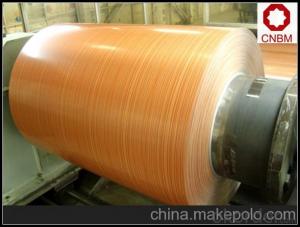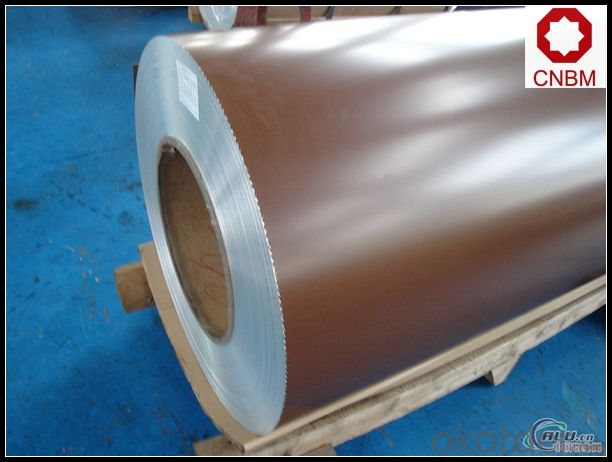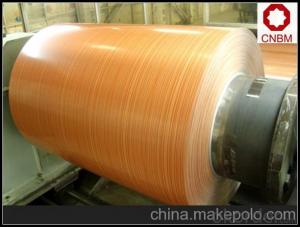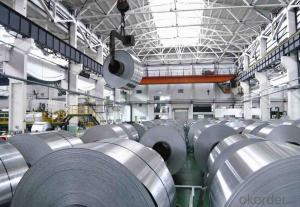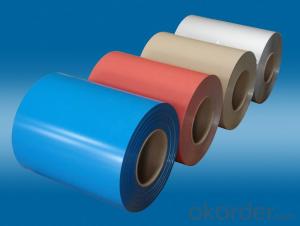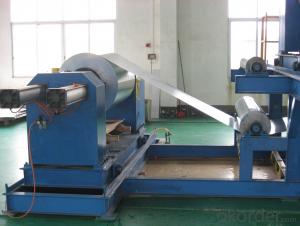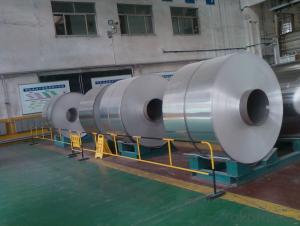Aluminum Coil 0.05 X 102 - Wooden Pattern Roll Coated Aluminum Coil
- Loading Port:
- Shanghai
- Payment Terms:
- TT OR LC
- Min Order Qty:
- 5 m.t.
- Supply Capability:
- 10000 m.t./month
OKorder Service Pledge
OKorder Financial Service
You Might Also Like
Specification
1. Specification of Wooden Pattern Roll Coated Aluminum Coil
Thickness | 0.1mm-10mm |
Popular Thickness | 0.1mm/0.2mm/0.25mm/0.3mm/0.6mm/0.8mm/1.0mm/1.2mm/1.5mm/2.0mm/3.0mm... |
Width | 20mm-2500mm |
inner diameter | 505mm 508mm 605mm |
Material | 1050,1060,1070,1100,1200,3003,3004,3005,5052,5005,5754,5083 |
Temper | O,H12,H14,H16,H18,H22,H24,H26,H32,H34,H36,H38,H111,H112 |
Surface | mill finish |
Packing | Export standard wooden pallets |
Payment Terms | 100% irrevocable L/C at sight or 30% T/T in advance as deposit,70% balance against the B/L copy |
Minimum Order Quantity | 5000kg |
Delivery time | 15-25 days after receiving L/C or deposit |
Remark | Specific requirement of alloy grade, temper or specification can be discussed at your request |
2. Application of Wooden Pattern Roll Coated Aluminum Coil
(1).Interior: wall cladding, ceilings, bathrooms, kitchens and balconies, shutters, doors...
(2).Exterior: wall cladding, facades, roofing, canopies, tunnels,column covers , renovations...
(3).Advertisement: display platforms, signboards, fascia, shop fronts...
3. Feature of Wooden Pattern Roll Coated Aluminum Coil
*Such coil is specially designed to replace aluminum ingot, due to the high export tax of aluminum ingot, the coil has better price than ingot.
*This type of coil can fit customer's remelting furnace just like ingot, no need to make any change to the production line that was previously used for ingot. The standard coil size and weight is very suitable for the feed gate of furnace.
*This type of coil causes less material wastage than ingot when remelted.
*Our coil is made directly from ore, no need to go though the ingot making process, quality is much better than other suppliers who use ingot scrap to make coil.
Be free from Oil Stain, Dent, Inclusion, Scratches, Stain, Oxide Dicoloration, Breaks, Corrosion, Roll Marks, Dirt Streaks and other defect which will interfere with use
4. Certificate:
SGS and ROHS(if client request, paid by client), MTC(plant provided), Certificate of Origin(FORM A, FORM E, CO), Bureau Veritas and SGS (if client request, paid by client), CIQS certificate
5. Image of Wooden Pattern Roll Coated Aluminum Coil
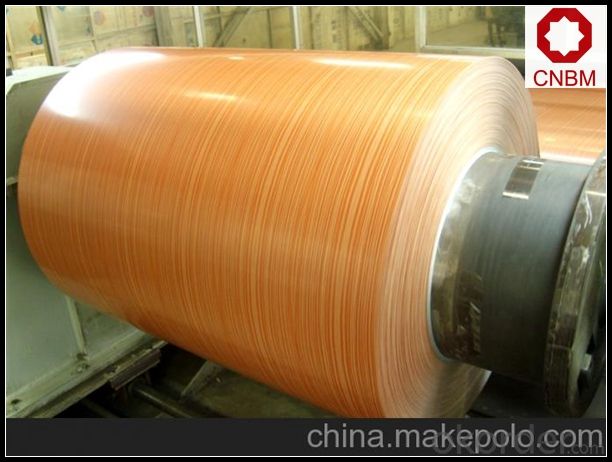
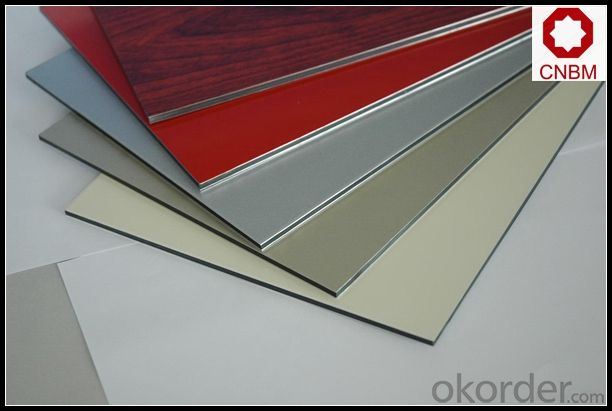
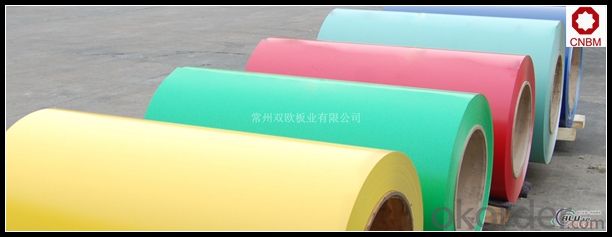
6. Package and shipping of Wooden Pattern Roll Coated Aluminum Coil
eye to wall
eye to the wall
with wood pallet (wooded case also available)
7. FAQ
1) What is the delivery time?
Dpends on actual order, around 20 to 35 days
2)What is the QC system:
We have QC staff of 20 persons and advanced equipment, each production is with MTC traced from Aluminum ingot lot.
3) What market do you mainly sell to?
Australia, America, Asia, Middle East, Western Europe, Africa etc
- Q: Can you create a tank, AFV, IFV etc. from aluminium or is this just a stupid idea that would kill everyone inside?
- Aluminium Armor
- Q: How many atoms are there in a piece of aluminum foil, 7.3 inches in length and 12.0 inches in width, and 0.141 mm thick? According to this problem, aluminum foil is a flat-rolled product, rectangular in cross section, of thickness from 0.006(0.15mm) to 0.00025(0.006mm). The density of Al is 2.699 g/cm3.
- the nice and cozy button is Avogadro' sort that's 6.0226 x 10^23 atoms consistent with mole So if the cost of the Al roll is $2.fifty two for one lb Then proceed as follows: a million lb = 454 gms At Wt Al = 26.ninety 8 gms consistent with mole Moles of Al in a million lb = 454/26.ninety 8 = sixteen.80 two moles sort of atms of Al = sixteen.80 two x 6.0226 x 10^23 = a million.013 x 10^25 cost consistent with atom = $2.fifty two / a million.013 x 10^25 = $2.2847 x 10^-25 consistent with atom or 0.0000000000000000000000228 cents consistent with atom. BTW, you probably did no longer finished specify the situation - how thick is teh Al foil? In any journey Al atoms are enormously inexpensive. desire this helps
- Q: Are aluminum coils available in different colors?
- Yes, aluminum coils are available in different colors. The process of coloring aluminum coils involves coating the surface with a durable finish that can be in various colors. This coating is typically achieved through a process called coil coating, where the aluminum coil is cleaned, pre-treated, and then coated with a layer of paint or other colored material. This allows for a wide range of colors to be applied to the aluminum coils, providing flexibility in design and aesthetic options for various applications.
- Q: We are shopping for a new LQ trailer. We are looking at several different brands and noticed that some have aluminum skin on an aluminum frame, and others have aluminum skin on a steel frame. Other than the obvious differences in weight and cost, what are other benefits/disadvantages of each? Thanks
- Aluminum Trailer Frames
- Q: helicopters rotorblades are made of honeycombed aluminum to give them strength, so isn't it a good idea for automakers to use the same technology to strengthen the frames of autos to make them lesslikely to cave in during a side impact auto accident?
- hmm, so if a helicopter rotor collided with say a tree, you think the rotor would survive?
- Q: i've been looking all over the internet for this information and i cant fin it! please help!what is aluminum's isotopic notation?what is aluminum's density at room temperature with units?what is aluminum's most common oxidation # ?aluminums e-dot diagram? symbol with valence electronschemical equation?enviornmental concers?
- isotopic okorder type environmental hazards of aluminum in the search bar and press search
- Q: Are aluminum coils suitable for high-temperature applications?
- Aluminum coils are generally not suitable for high-temperature applications. While aluminum has many beneficial properties such as lightweight and corrosion resistance, it has a relatively low melting point of around 660 degrees Celsius (1220 degrees Fahrenheit). This means that aluminum coils may not be able to withstand the extreme heat typically associated with high-temperature applications. In high-temperature environments, materials with higher melting points such as stainless steel or nickel alloys are often preferred. These materials can withstand higher temperatures without losing their structural integrity or experiencing significant deformation. However, it is worth noting that there are certain aluminum alloys that have been developed to have improved high-temperature properties. These alloys typically contain elements such as copper, magnesium, or zinc, which enhance their strength and heat resistance. These specialized aluminum alloys may be suitable for specific high-temperature applications where their unique properties are required. In conclusion, while standard aluminum coils may not be suitable for high-temperature applications, there are specialized aluminum alloys available that can provide better performance in elevated temperature environments. It is important to consider the specific temperature requirements and consult with experts to determine the most suitable material for a particular high-temperature application.
- Q: Is it possible to create a flowerpot using an aluminum coil?
- <p>Yes, you can use an aluminum coil to make a flowerpot. Aluminum is lightweight, durable, and can be easily shaped, making it a suitable material for crafting flowerpots. To create a flowerpot, you would need to cut the coil to the desired size, shape it into a pot form, and possibly add drainage holes. Ensure the aluminum is cleaned and treated to prevent any potential harm to the plants due to chemical reactions with the soil.</p>
- Q: what is the final temperature of 250g of water whose initial Temperature is 25 C if 80-g of aluminum initially at 70 C is dropped into the water? The specific heat of aluminum is 0.215 cal/C g how do you do it? our teacher did not show us how and it is not in the book
- Given Data :-- Mass : Aluminium m(a) = 80 g, Water m(w) = 250 g Initial Temperature : Aluminium t? = 70 C and Water t?' = 25 C Final Temperature of both ( aluminium and water ) = T C (assume) Since Aluminium is initially at a temperature higher than that of water, it (aluminium) will lose heat to water . Heat lost by Al = Q = mass of Aluminium x sp.heat capacity of Aluminium x Temp. change = Q = 80 x 0.215 x ( 70 - T ) cal Heat gained by water = Q' = mass of water x sp.heat capacity of water x Temp. change = Q' = 250 x 1 x ( T - 25 ) According to principle of calorimetery . = Heat lost by aluminium = heat gained by water. = 250 x 1 x ( T - 25 ) = 80 x 0.215 x ( 70 - T ) = T = 27.9 C .... ( Rounded to one decimal place )...... Answer Answer .
- Q: Explain the differences between aluminum coil and aluminum foil when used in food packaging.
- <p>Aluminum coil and aluminum foil are both used in food packaging but serve different purposes. Aluminum coil is typically thicker and more rigid, used for making aluminum cans and containers. It provides a strong barrier against light, air, and moisture, which is crucial for preserving the quality and freshness of food. Aluminum foil, on the other hand, is thinner and more flexible, often used for wrapping food to protect it from contamination and to retain heat or cold during cooking or storage. It's also used for baking and roasting to prevent food from sticking to the pan or to add a crispy texture. While both materials are recyclable and provide a barrier against external elements, their specific applications in food packaging differ based on their physical properties and the needs of the packaging process.</p>
Send your message to us
Aluminum Coil 0.05 X 102 - Wooden Pattern Roll Coated Aluminum Coil
- Loading Port:
- Shanghai
- Payment Terms:
- TT OR LC
- Min Order Qty:
- 5 m.t.
- Supply Capability:
- 10000 m.t./month
OKorder Service Pledge
OKorder Financial Service
Similar products
Hot products
Hot Searches
Related keywords
